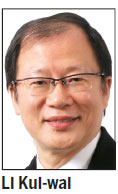HK has adopted a sensible fiscal policy
Updated: 2014-08-11 05:43
By Li Kui-wai(HK Edition)
|
|||||||||
Financial Secretary John Tsang has recently announced there will be a mild fiscal squeeze in Hong Kong in the future. This will entail 1 percent spending cuts for every government department.
The money saved will be returned to the relevant government departments in the future. In the short-term the economy is experiencing both low unemployment and low inflation. So it is an appropriate time to reduce government spending. This will help control inflation, which can steadily erode people's purchasing power. In other words, the government should avoid encouraging inflation by spending when the economy is buoyant. Good fiscal discipline dictates that government spending be contrary to the business cycles. Therefore the government should spend more during recession to help the needy. But it should try to save during boom times to avoid the economy overheating.
Hong Kong's many years of fiscal surplus is a fine record and an economic strength rather than a burden. Indeed, Hong Kong's strong fiscal performance is the envy of many nations. So the 1 percent spending cut serves more as a warning than a reduction in the quality of government services. In fact it offers an opportunity for government departments to encourage efficiency. Given the high level of social and economic development in Hong Kong, this is a sensible policy.

Secondly, the openness of Hong Kong's economy means that shocks to the global economy can easily affect Hong Kong.
Examples of this may include changes to US interest rates in 2015, the strength or weakness of the euro, imbalances in the mainland economy and greater use of yuan. Instability in remote parts of the world and unforeseen changes in Asia may also have an adverse affect upon Hong Kong.
The 1 percent spending cuts are needed because of the risk of future problems. Many welfare advocates argue that the SAR government has a healthy fiscal surplus and should spend more. But this is a naive argument. Governments cannot spend simply because there is a surplus. Welfare spending can spiral out of control because the more money is spent, the more will be needed.
In some ways, fiscal policy in Hong Kong has gone in the wrong direction since 1995. At that time the economy was in good shape but the government of the day increased short-term welfare expenditure. It was during a period of full employment, asset booms and rising inflation. It resulted in an asset bubble which burst during the 1997-98 Asian financial crisis.
However, large increases in welfare since 1995 have been matched by increases in tax exemptions. Consequently, there was greater need for expenditure. But the budget was now constrained by a narrower tax base. This was the worst of both worlds.
As a consequence, Hong Kong reported its largest fiscal deficit following the 1997-98 crisis. There were discussions about widening the tax base - including the possible introduction of a goods and sales tax (GST). Alleviating Hong Kong's structural problems was set to take time. It was therefore appropriate that in 2005, government bonds were used as a monetary instrument. The economic justification was that it was better to "save and borrow" than just to drain fiscal reserves. Hong Kong returned to fiscal surplus soon after this.
But the openness of the Hong Kong economy makes it vulnerable to external events. To prepare for these unexpected shocks, fiscal policy is effective in ensuring economic stability. It is a good way to smooth out rough parts of the business cycle. Hong Kong's significant fiscal reserves are more than a sign of economic strength. They also demonstrate to local and foreign businesses that Hong Kong has the fiscal buffers to deal effectively with financial shocks.
Therefore, it would be better if the financial secretary, during this stage of the business cycle, focused on strengthening Hong Kong's economic capacity and skill base. Increasing welfare will not be effective. It will only increase spending - not economic output. Although unemployment is low, job security is unstable in terms of skill advancement and upward social mobility. Hong Kong economy is plagued with a vicious spiral of high property prices and a narrow range of services. Certain government policies do not encourage the consistent development of the economy.
So reducing fiscal spending is an important step. But resources saved should be used to develop Hong Kong's economy. They should be directed to enlarging economic capacity and improving skills.
The government should stay in the back seat rather than engaging in economic intervention. Economic development should focus on productivity and output. Only this can actually enhance the welfare of all. Welfare and redistribution policies should only be used to help those seriously in need.
The author is a professor at the Department of Economics and Finance, City University of Hong Kong.
(HK Edition 08/11/2014 page9)